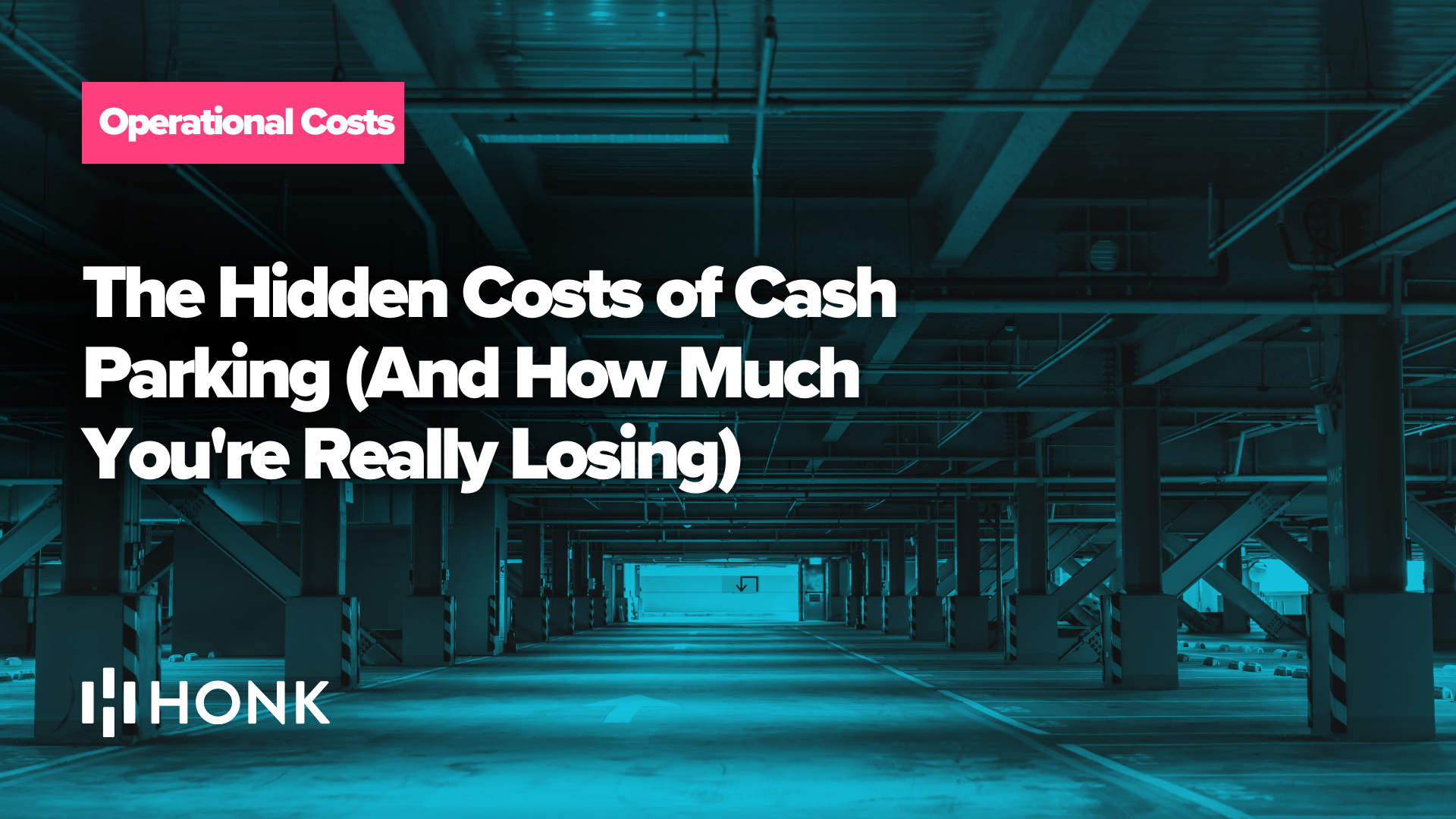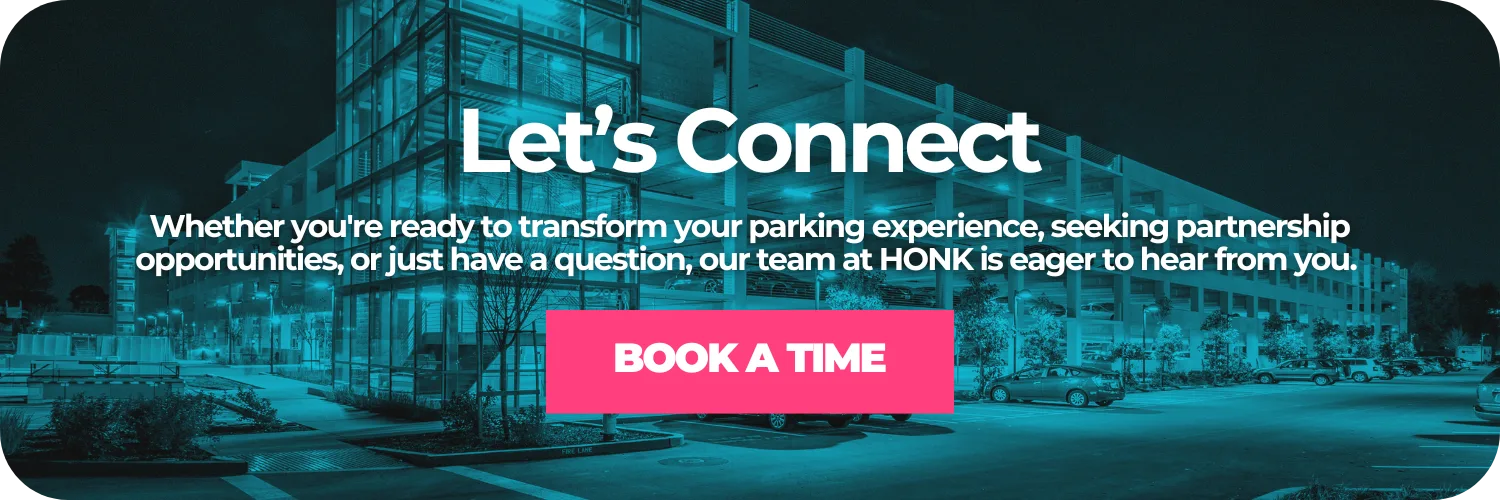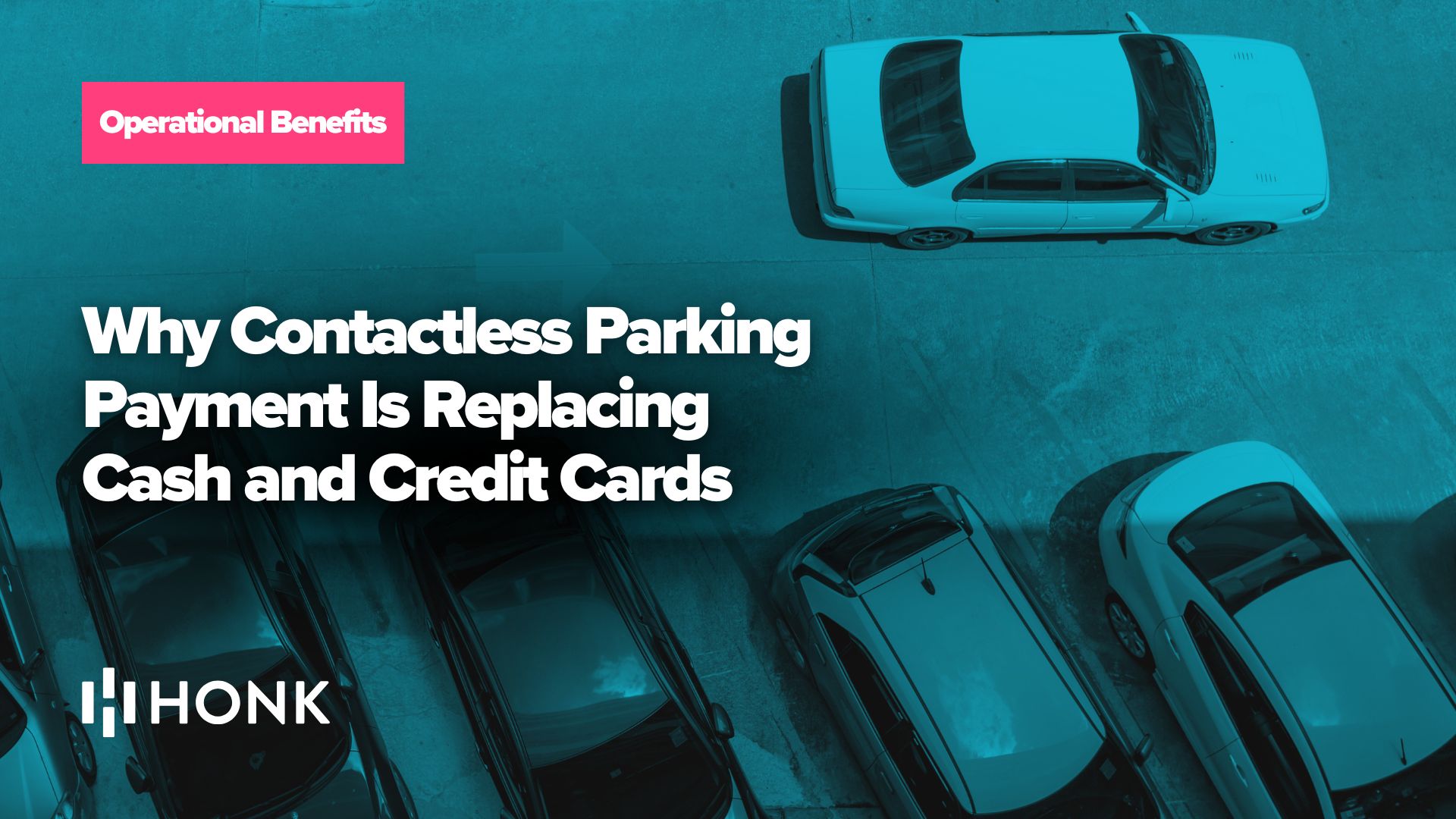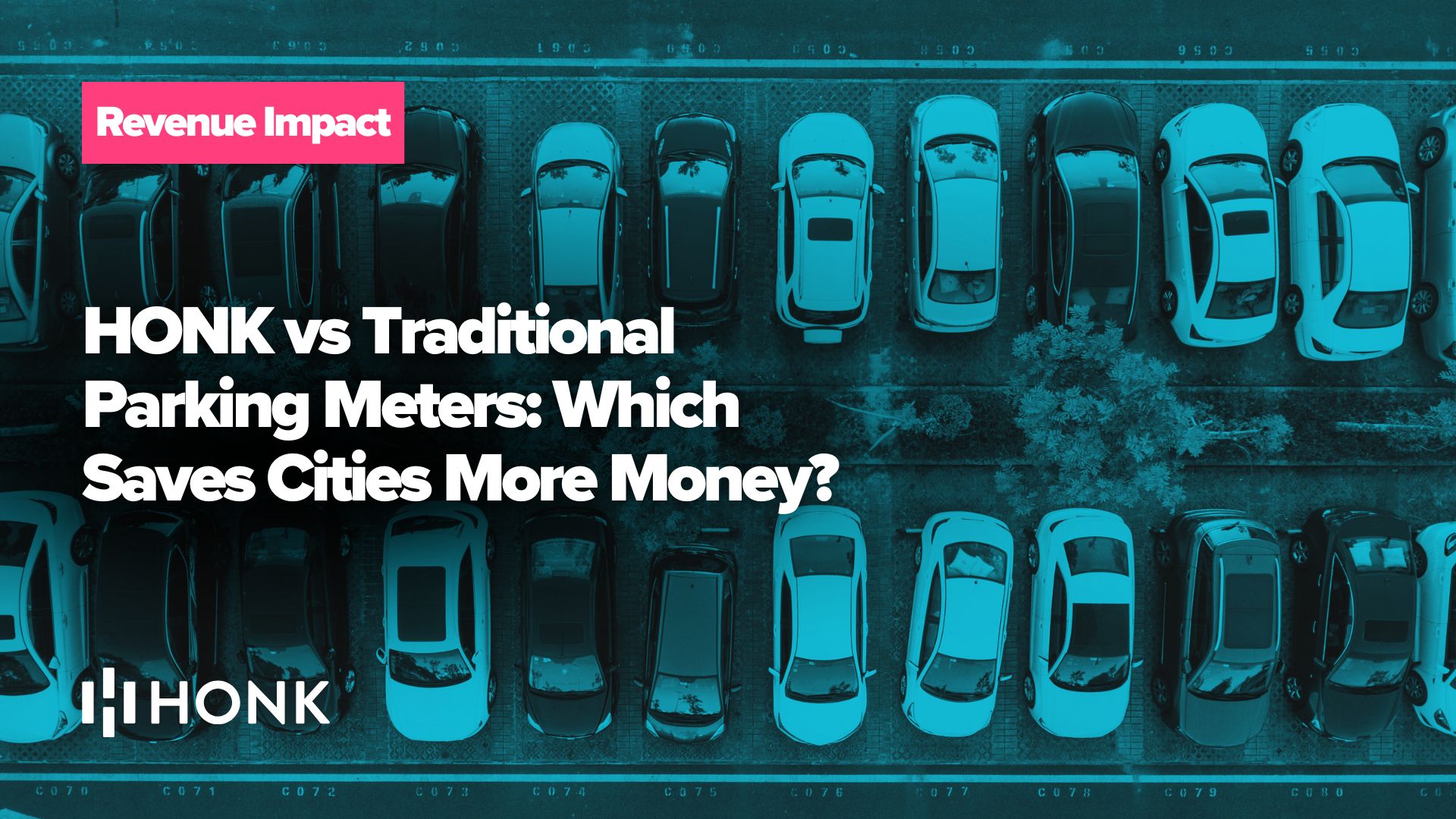Running a parking operation on cash seems simple enough. Drivers pull up, drop some coins in the meter or pay station, and you collect the money later. No apps to manage, no credit card processing fees, no complicated technology to maintain. It’s the way parking has worked for decades, so why change it now? Here’s the problem. That apparent simplicity is costing you far more than you realize, and the hidden expenses add up fast.
If you’re still relying primarily on cash for your parking operation, you’re leaving serious money on the table every single day. Between theft and shrinkage, processing expenses, staff time, maintenance costs, security risks, and compliance headaches, cash parking creates a web of hidden costs that eat directly into your bottom line. At HONK, we work with parking operators across North America who’ve made the transition from cash to digital payments, and the financial impact is consistently eye-opening. Let’s break down exactly what cash parking is costing you, and why so many operators are finally ready to make a change.
The Theft Problem You Can’t Ignore
Let’s start with the most obvious cost. Cash is a target, plain and simple. Parking meters filled with coins attract thieves, and the problem is far more widespread than most operators want to admit. In Vancouver, city officials reported that out-of-service meters (many due to vandalism and theft) represented about five percent of their 10,000 meter population at any given time. If just four people per day put one dollar into a tampered meter, the annual losses would top $600,000 for that city alone. Think about that for a moment. That’s more than half a million dollars lost not because people didn’t try to pay, but because vandals got there first.
The issue isn’t limited to one city. Buffalo, New York experienced an infamous case where a parking meter mechanic and his accomplice rigged over 75 meters to steal quarters over eight years, ultimately making off with more than $210,000. The FBI investigation found $47,000 in cash and quarters hidden in the mechanic’s home, including $40,000 stashed in his bedroom ceiling. These aren’t isolated incidents. They’re symptoms of a fundamental problem with cash-based systems. When your revenue sits in physical boxes on the street, you’re essentially operating hundreds of tiny ATMs that anyone can target.
Theft happens at multiple points in the cash collection process. Meters get vandalized, with thieves jamming coin slots and returning later with magnets or homemade devices to fish out coins. Collection staff face temptation when handling large amounts of cash without proper oversight. Even armored car services aren’t immune to internal theft or route targeting by criminals who’ve learned collection patterns. Every link in the cash chain represents a potential point of revenue loss, and unlike digital payments where every transaction leaves a clear audit trail, cash losses can be difficult to detect until it’s too late.
Processing Fees and Collection Costs Add Up Fast
Beyond outright theft, the operational costs of handling cash are staggering. Armored car services don’t come cheap. The armored car services market reached $4.3 billion in 2024, with sustained annual growth of 6.8 percent over the past three years. That growth isn’t happening because services are getting cheaper. It’s happening because handling cash requires specialized security that comes at a premium price. If you’re paying for regular armored car pickups, those fees eat directly into your parking revenue before you see a dime.
But armored car fees are just the beginning. Once your cash reaches a secure facility, it needs to be counted, sorted, verified, and deposited. Coin counting equipment requires purchase or lease, maintenance, and trained staff to operate it. Manual counting introduces human error, leading to discrepancies that require investigation and reconciliation. Some operators underestimate these costs because they’re spread across different budget lines, but when you add up the full picture including vehicle costs, fuel, labor hours, equipment maintenance, and facility expenses, cash processing can consume 15 to 20 percent of gross parking revenue.
Compare that to digital payment processing, where transaction fees typically run 2 to 3 percent and the entire process is automated. With contactless parking technology, money moves from the customer’s account directly into yours with no physical handling required. There’s no collection route to plan, no coins to count, no armored car to schedule, and no secure facility needed for storage. The cost difference becomes even more dramatic when you factor in that digital systems process payments faster, which directly impacts parking turnover rates and overall revenue generation.
Your Staff Time Is Worth More Than Counting Coins
Let’s talk about labor costs, because this is where cash parking gets really expensive in ways that don’t always show up clearly on financial statements. How much time does your team spend managing cash? Really think about it. Collection staff drive routes to empty meters and pay stations. Someone counts the coins, verifies the amounts, and prepares bank deposits. Your accounting team reconciles cash receipts against meter readings and investigates discrepancies. Maintenance crews repair vandalized meters and clear coin jams. Management reviews cash handling procedures and deals with security concerns.
Add up all those hours across a week or a month, and the numbers become shocking. In cities with extensive meter operations, collection staff harvest over 100 kilograms of coins daily. That’s hundreds of pounds of metal that needs to be physically moved, secured, transported, counted, and deposited. Every step requires human labor that could be deployed more productively elsewhere in your operation. When San Francisco addressed meter vandalism, they devoted teams working six days per week just to assess and repair damaged meters. That’s a massive ongoing labor expense driven entirely by the limitations of cash-based systems.
Digital payments eliminate most of this labor entirely. Payments process automatically, reconciliation happens in real time, and your staff can focus on enforcement, customer service, and strategic improvements rather than manual cash handling. The labor savings alone often justify the investment in modern parking technology, even before considering the other cost benefits. When operators ask us about return on investment, staff time reallocation consistently ranks as one of the most tangible and immediate benefits they experience after transitioning away from cash.
Maintenance Costs Drain Resources Continuously
Cash parking infrastructure requires constant maintenance, and those costs never stop. Mechanical coin acceptors jam, wear out, and break down. Pay stations need regular servicing to keep card readers, bill acceptors, and printers functioning. Vandalism damage requires repairs or full unit replacements. Weather exposure takes its toll on equipment, especially in harsh climates where temperature extremes and moisture cause corrosion and component failure. The maintenance burden is relentless.
Some of the worst maintenance issues stem from the cash handling mechanisms themselves. Coin jams happen frequently, especially when drivers insert foreign coins, damaged coins, or deliberately try to game the system. Each jam requires a service call, which means sending a technician to the meter, diagnosing the problem, clearing the jam, and testing the unit before putting it back in service. Meanwhile, that meter sits out of order, generating zero revenue and potentially creating compliance issues if drivers park without paying and claim the meter wasn’t working.
Pay stations have even more complex maintenance requirements because they combine multiple payment technologies in a single unit. Cash acceptors, card readers, thermal printers, touchscreens, and communication modules all need regular maintenance and eventual replacement. When one component fails, the entire station may go offline until repairs are completed. Operators report that maintaining pay stations costs significantly more per year than maintaining simpler digital-only payment solutions. The hardware complexity of cash-handling equipment creates a maintenance burden that grows more expensive over time as equipment ages and replacement parts become harder to source.
Modern cloud-based parking systems dramatically reduce these maintenance headaches. Digital payments don’t jam, don’t require coin mechanisms, and have far fewer moving parts to break down. When maintenance is needed, many issues can be diagnosed and resolved remotely without requiring technician visits. The data-driven insights available through modern platforms also help identify problems before they become critical, enabling proactive maintenance that costs less and causes less downtime than reactive repairs.
Security Risks Create Liability and Insurance Costs
Cash creates security vulnerabilities that extend well beyond simple theft. You’re responsible for the safety of collection staff who transport cash, which means providing secure vehicles, training, and procedures to minimize risk. You need insurance coverage for cash in transit and storage, and those premiums aren’t cheap when you’re moving thousands of dollars in physical currency every week. You face potential liability if collection staff are injured during theft attempts or robberies. And you need secure facilities with proper safeguards for storing cash before it reaches the bank.
The security measures required for cash operations represent ongoing expenses that many operators don’t fully account for. Tamper-evident bags, GPS tracking for collection vehicles, surveillance cameras, secure storage vaults, background checks for staff with cash access, and dual-control procedures all cost money to implement and maintain. These aren’t optional expenses. They’re necessary safeguards to protect revenue and limit liability exposure. But they wouldn’t be necessary at all if you weren’t handling physical cash.
Consider the risk profile. Cash sitting in meters and pay stations is vulnerable 24/7. Collection staff carrying large amounts of cash are potential targets. Secure storage facilities can be compromised. Every point where physical currency exists represents a security risk that requires mitigation. Digital payments eliminate these vulnerabilities entirely. Money moves electronically with encryption and authentication, leaving no physical target for thieves. Your insurance costs drop, your liability exposure decreases, and your staff operate more safely. The security benefits alone make a compelling case for transitioning away from cash, even before considering the other cost savings.
IRS Compliance and Audit Headaches
Here’s a cost that catches many operators off guard. Cash handling creates significant compliance and audit requirements that digital payments largely eliminate. The IRS expects detailed documentation for cash transactions, and parking operations handle enough cash volume to attract scrutiny. You need proper procedures for tracking cash from collection through deposit, documented counts and reconciliations, clear audit trails showing who handled money at each stage, and secure record-keeping for all transactions.
When audits happen, cash-based operations face intensive review of their handling procedures. Auditors want to see that you can account for every dollar collected, that your internal controls prevent theft and fraud, and that your reported revenue matches the actual cash flow through your system. Any discrepancies trigger questions, and significant gaps can result in penalties or disputed tax assessments. The documentation burden for cash operations is substantial, requiring careful record-keeping and often dedicated accounting resources to ensure compliance.
Digital payment systems create automatic audit trails that satisfy compliance requirements with minimal manual effort. Every transaction is logged with timestamps, amounts, payment methods, and location data. Reports generate automatically, reconciliation happens in real time, and you can prove exactly what was collected, when, and where. This level of documentation is nearly impossible to achieve with cash-based systems without significant administrative overhead. When tax season arrives or audits occur, operators with modern digital systems spend a fraction of the time on compliance compared to those still wrestling with cash documentation.
The Compounding Effect on Revenue
All these hidden costs compound to create a significant drag on your bottom line. Let’s do some quick math. Assume you operate 100 parking spaces in a mid-sized lot with average revenue of $50 per space per day. That’s $5,000 in daily revenue, or roughly $1.8 million annually. Now consider the hidden costs of cash. If theft and shrinkage cost you 3 percent, that’s $54,000 lost. If processing and collection expenses run 15 percent, that’s $270,000. If maintenance issues and downtime reduce effective capacity by 5 percent, that’s $90,000 in lost opportunity. Add security costs, compliance expenses, and inefficient labor allocation, and you could easily be losing $500,000 or more annually to the hidden costs of cash parking.
That half million dollars represents revenue you’ve already earned but can’t keep because of the limitations and vulnerabilities of cash-based systems. It’s money that could fund facility improvements, staff raises, expanded capacity, or simply flow to your bottom line as profit. Instead, it evaporates through the countless friction points that cash creates. The frustrating part is that these costs often aren’t visible in a single line item. They’re scattered across operational budgets, hidden in general maintenance expenses, buried in security costs, and absorbed as accepted overhead. But when you add them all together and see the full impact, the case for change becomes undeniable.
As your operation grows, adding more locations or more spaces, manual workflows become even more cumbersome and expensive. Automation scales effortlessly. Whether you manage five lots or fifty, a cloud-based platform handles it all from one centralized dashboard. You can monitor every facility in real time, adjust pricing across multiple locations simultaneously, and generate unified reports that give you a complete picture of your business. This level of efficiency simply isn’t possible with cash-based processes, and the financial impact shows up directly in your bottom line.
Time to Stop Leaving Money on the Table
If you recognize even one of these problems in your operation, you’re almost certainly losing revenue that you could be capturing. Theft robs you directly. Processing costs consume your margins. Staff time gets wasted on manual tasks. Maintenance issues create endless expenses. Security requirements add overhead. Compliance burdens drain resources. And all of it together means you’re working harder and earning less than you should be. The parking industry has evolved dramatically, and operators who embrace modern, cashless technology are seeing measurable improvements across every metric that matters.
They’re capturing more revenue per space because digital payments are faster and more convenient, which reduces wait times and improves turnover. They’re reducing operational costs because automation eliminates manual processes and their associated labor expenses. They’re improving customer satisfaction because drivers appreciate the convenience of paying with phones or cards instead of scrambling for exact change. And they’re making smarter decisions backed by real-time data that cash systems simply can’t provide. The technology exists today to solve all these problems, and the return on investment is clear.
At HONK, we’ve built a platform specifically designed to address these challenges. From digital payments and contactless access to automated enforcement, dynamic pricing, and comprehensive analytics, we help parking operators modernize their operations and unlock revenue they didn’t know they were missing. Whether you manage a single lot or a network of facilities across multiple cities, our cloud-based solution scales to meet your needs. If you’re tired of watching revenue slip through the cracks and dealing with outdated systems that create more problems than they solve, it’s time to make a change. The longer you wait, the more money you’re leaving on the table. Contact HONK today to discover how easy it is to transform your parking operation into a modern, profitable, data-driven business.





